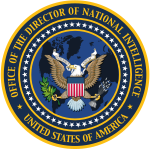Principal Deputy Director of National Intelligence
| Director of National Intelligence of the United States of America | |
|---|---|

Seal of the Director of National Intelligence
|
|
| United States Intelligence Community | |
| Member of |
|
| Reports to | The President |
| Seat | Washington, D.C. |
| Appointer | The President with Senate advice and consent |
| Term length | Appointed |
| Precursor | Director of Central Intelligence (CIA) |
| Formation | April 22, 2005 |
| First holder | John Negroponte |
| Deputy | Principal Deputy Director Susan M. Gordon |
| Website | www |
The Director of National Intelligence (DNI) is the United States government cabinet-level official – subject to the authority, direction, and control of the President – required by the Intelligence Reform and Terrorism Prevention Act of 2004 to:
On July 30, 2008, President George W. Bush issued Executive Order 13470, amending Executive Order 12333 to strengthen the DNI's role. Further, by Presidential Policy Directive 19 signed by Barack Obama in October 2012, the DNI was given overall responsibility for Intelligence Community whistleblowing and source protection.
Under 50 U.S.C. § 403-3a, "under ordinary circumstances, it is desirable" that either the Director or the Principal Deputy Director of National Intelligence be an active-duty commissioned officer in the armed forces or have training or experience in military intelligence activities and requirements. Only one of the two positions can be held by a military officer at any given time. The statute does not specify what rank the commissioned officer will hold during his or her tenure in either position. On July 20, 2010, President Obama nominated retired Lt. (three-star) Gen. James R. Clapper for the position. Clapper was confirmed by the Senate on August 5, 2010, and replaced acting Director David C. Gompert. The prior DNI was retired Navy four-star admiral Dennis C. Blair, whose resignation became effective May 28, 2010.
...
Wikipedia

